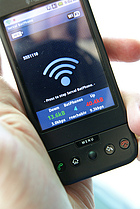NLnet funds disaster zone phone software
[Press release Thursday, April 14 2011; Nederlands ![]() ]
]
Software developed by Australian Flinders University's Dr Paul Gardner-Stephen which enables mobile phones to communicate during a disaster will be freely available to the public by the end of the year thanks to the support of the Netherlands based NLnet Foundation.
The Serval BatPhone software can be used on compatible mobile phone handsets to create an alternative "network" where conventional mobile phone coverage has been destroyed or simply does not exist. Instead of relying on mobile phone towers, the Serval system relays calls for one mobile phone to another as either a "closed" network or to connect to a temporary tower.
Dr Gardner-Stephen, Research Fellow (Rural, Remote and Humanitarian Telecommunications) at Flinders School of Computer Science, Engineering and Mathematics in Adelaide (Australia), said NLnet’s contribution of about AUD 40,000 would be a significant boost for his Serval Project team.
"We are delighted to receive the support of the NLnet Foundation, an organisation dedicated to supporting ventures and people that contribute to an open information society," Dr Gardner-Stephen said. "We currently have seven Flinders and INSA Telecommunications exchange students developing the Serval BatPhone software. They are getting valuable, real-world experience as they work on this integrated and substantial humanitarian software engineering project," he said.
"NLnet’s support will go towards project management and senior developer resources to more effectively manage the team’s coordinated efforts. It’s a significant step towards our goal of making Serval BatPhone freely available in a first public release later this year."
"We are delighted to receive the support of the NLnet Foundation, an organisation dedicated to supporting ventures and people that contribute to an open information society," Dr Gardner-Stephen said. "We currently have seven Flinders and INSA Telecommunications exchange students developing the Serval BatPhone
Valer Mischenko, NLnet’s director said mobile communication have become an inescapable part of our lives. "Unfortunately, existing systems relying exclusively on commercial operators' networks can neither be called reliable enough, such as in disaster situations, nor secure enough, such as in circumstances of changing political situation - and they are not legally sustainable, as they are easily prone to various forms of cyber attack," Mr Mischenko said.
"One may call the Serval system 'an operator-less mobile network', which can take over when operators' networks fail for one reason or another. We are very glad with such initiatives which help to implement our mission and make networks based communication reliable and trustworthy," he said.
"NLnet Foundation sponsors tens of bigger and smaller networking technology related projects every year. The results of these projects are all open and can be freely used for further development of the technology."
About NLnet Foundation
NLnet Foundation is a widely respected private charity fund supporting developments of networking technology worldwide, and has over the years actively contributed to (internet) standards, open source projects and subsidiary or enabling activities such as the development of GPLv3. NLnet Foundation's means came initially from interest on a substantial own capital formed in 1997 by the sale of the first Dutch Internet Service Provider. Its private capital ensures an absolute independent position. The articles of association for the NLnet Foundation state: "to promote the exchange of electronic information and all that is related or beneficial to that purpose". At any moment, dozens of projects are being supported worldwide.
About the Serval project
Communicate anywhere, any time ... without infrastructure, without mobile towers, without satellites, without wifi hotspots, and without carriers. Use existing off-the-shelf mobile cell phone handsets. Use your existing mobile phone number wherever you go to talk to people near you, without paying roaming charges.
Serval enables mobile communications no matter what your circumstance: mobile communications in the face of disaster, in the face of poverty, in the face of isolation, in the face of civil unrest, or in the face of network black-spots. In short, Serval provides resilient mobile communications for all people, anywhere in the universe.


